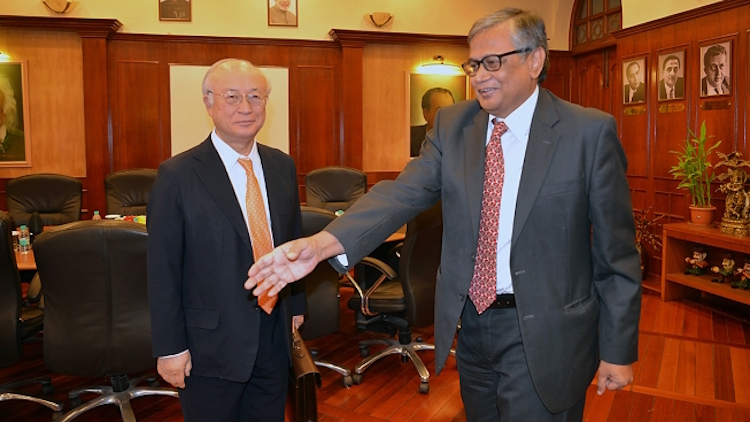By Devinder Kumar
NEW DELHI (IDN) – International Atomic Energy Agency (IAEA), set up in 1957 as the world’s ‘Atoms for Peace’ organization within the United Nations family, and the Atomic Energy Commission of India have agreed on an extended cooperation to the benefit of nuclear professionals from across Asia.
IAEA Director General Yukiya Amano and Sekhar Basu, Chairman of India’s Atomic Energy Commission, achieved the agreement during the former’s three-day visit to India from March 13 to 15.
The importance of the agreement derives from the fact that IAEA is world’s central intergovernmental forum for scientific and technical co-operation in the nuclear field. It works for the safe, secure and peaceful uses of nuclear science and technology, contributing to international peace and security and the UN’s Sustainable Development Goals (SDGs).
Though established independently of the UN through its own international treaty, the IAEA Statute, the IAEA reports to both the United Nations General Assembly and Security Council. The IAEA has its headquarters in Vienna.
The Indian Atomic Energy Commission was first set up in August 1948 in the Department of Scientific Research, which was created a few months earlier in June 1948. The Department of Atomic Energy (DAE) was setup on August 3, 1954 under the direct charge of the Prime Minister through a Presidential Order.
Subsequently, in accordance with a Government Resolution dated March 1, 1958, the Atomic Energy Commission was established in the Department of Atomic Energy. The then Prime Minister Jawaharlal Nehru also laid a copy of this Resolution on the table of the Lok Sabha (the lower House of Parliament) on March 24, 1958.
According to the agreement, IAEA-nominated experts in advanced nuclear energy, nuclear security, radiological safety, nuclear material characterisation and applications of radioisotopes and radiation technologies will be able to use the new training facilities of India’s Global Centre for Nuclear Energy Partnership (GCNEP), which are scheduled to open in New Delhi in the near future.
Government of India approved the establishment of GCNEP at village Jasaur Kheri & Kheri Jasaur, near Bahadurgarh, District Jhajjar, Haryana, in September 2010. It is the sixth Reseaech and Development (R&D) unit under the aegis of Department of Atomic Energy (DAE).
The Atomic Energy Commission Chairman Basu said, the Centre is purported to promote safe, secure and sustainable nuclear energy through global partnership. The IAEA will be able to use the facilities at GCNEP to train experts from the region and beyond in assisting building capacity.
Basu emphasized that India can also provide access to other research facilities to experts from other countries, facilitated through the IAEA. In the area of cancer care and control, he mentioned that India has donated Bhabhatron radiotherapy machines to several countries in Asia and Africa and would like to work closely with the IAEA to build the associated human resources in these beneficiary countries.
The Atomic Energy Commission Chairman informed the IAEA Director General that India has established a national grid of more than 100 cancer care centres, staffed with top specialists. With IAEA support, India would be ready to extend this network and convert it into a regional or global network, so that cancer care providers from other countries could also access the expertise available.
Amano acknowledged that India has been a reliable partner of the IAEA in fulfilling its mandate. India’s support to developing countries both directly and through the IAEA is extremely important, he said, as the IAEA is receiving an increased number of requests for support from Member States, including small island states, for capacity building.
During his three-day visit, IAEA Director General Amano also met Foreign Secretary S. Jaishankar and visited the Kudankulam Nuclear Power Plant in the southern Indian State of Tamil Nadu. He noted the advanced safety systems maintained in the plant, where two units are operational and another two are under construction.
The IAEA plays an active part in helping countries to use nuclear and isotopic techniques and thereby contribute directly to attaining nine of the 17 SDGs. These include: ending hunger, achieving food security and improved nutrition and promoting sustainable agriculture; ensuring healthy lives and promoting well-being for all at all ages; ensuring availability and sustainable management of water and sanitation for all; and ensuring access to affordable, reliable, sustainable and modern energy for all.
Other SDGs, the IAEA supports, aim at: building resilient infrastructure, promoting inclusive and sustainable industrialization and fostering innovation; taking urgent action to combat climate change and its impacts; conserving and sustainably using the oceans, seas and marine resources for sustainable development; protecting, restoring and promoting sustainable use of terrestrial ecosystems, sustainably managing forests, combating desertification, and halting and reversing land degradation and halting biodiversity loss; and strengthening the means of implementation and revitalize the global partnership for sustainable development. [IDN-InDepthNews – 25 March 2017]
Photo: IAEA Director General Yukiya Amano discussing cooperation between the Agency and India’s Atomic Energy Commission with Commission Chairman Sekhar Basu. Credit: Atomic Energy Commission, India.
IDN is flagship agency of the International Press Syndicate.

